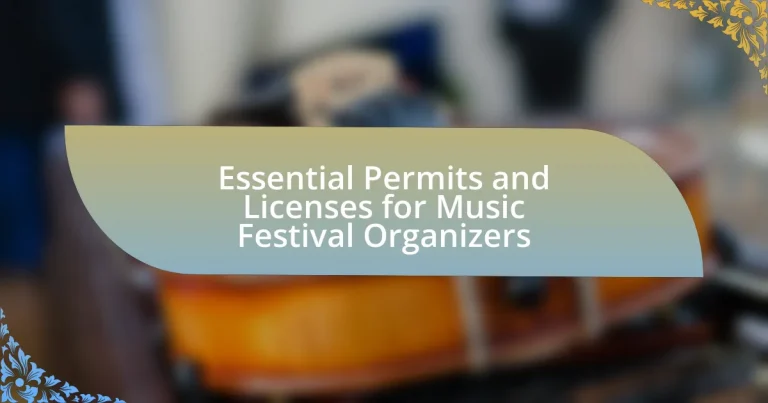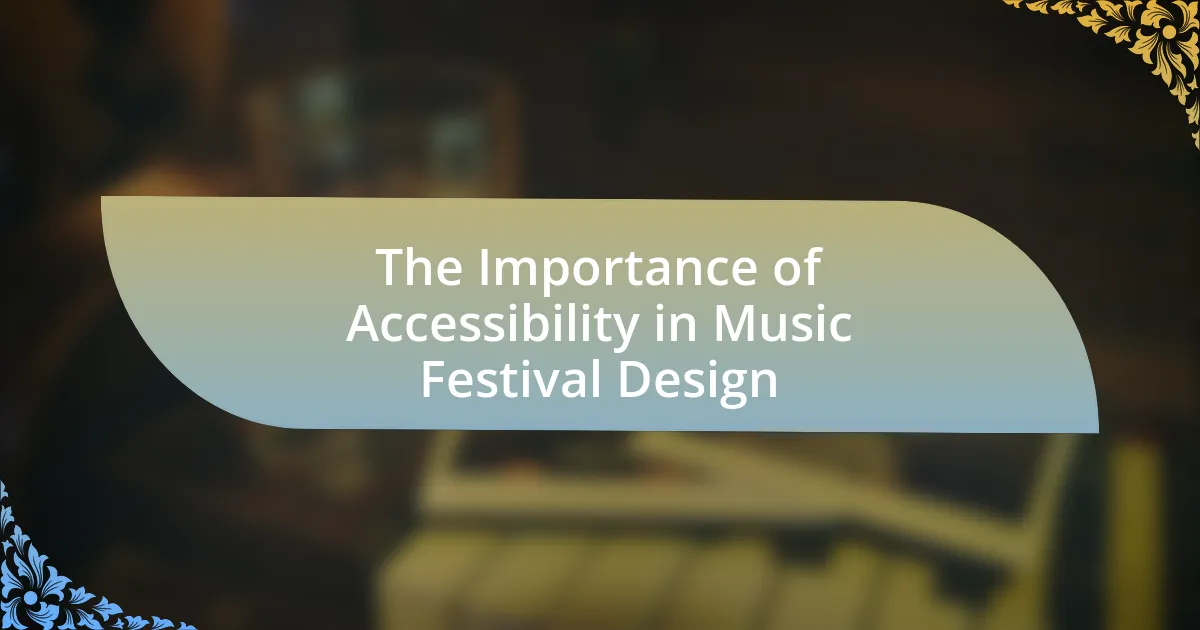Music festival organizers must secure various essential permits and licenses to operate legally, including special event permits, noise permits, health and safety permits, and liquor licenses. These legal requirements are crucial for ensuring compliance with local, state, and federal regulations, which protect public safety and facilitate smooth event execution. The article outlines the importance of these permits, the risks associated with operating without them, and the steps organizers should take to navigate the permitting process effectively. Additionally, it discusses common challenges faced by organizers, best practices for compliance, and resources available to assist in maintaining adherence to legal standards.
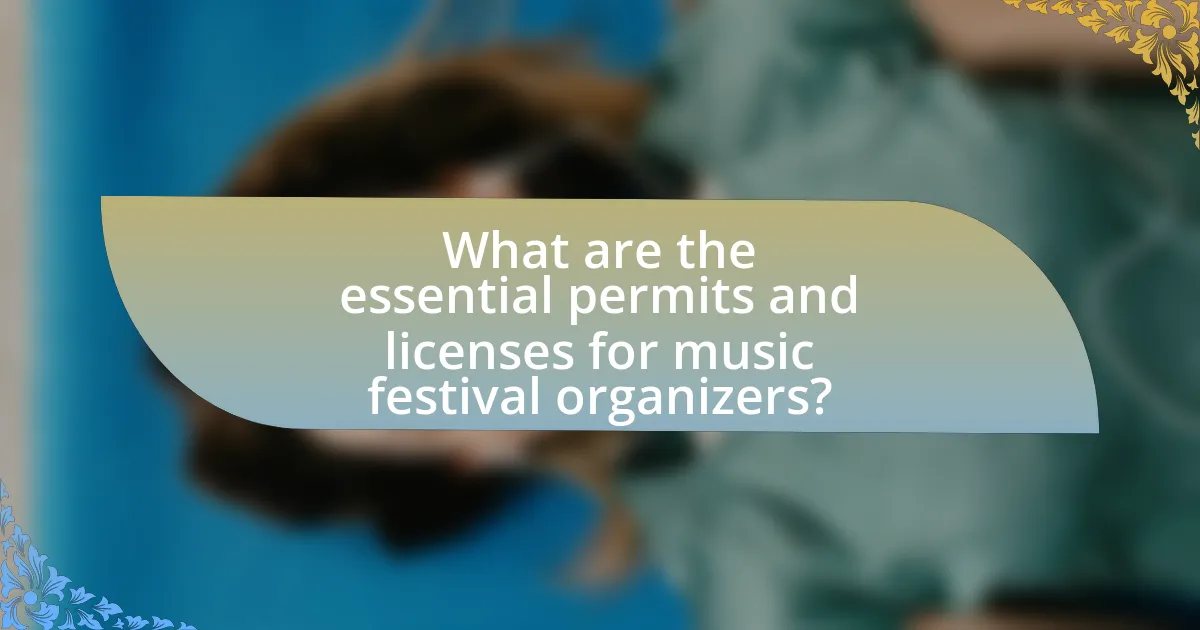
What are the essential permits and licenses for music festival organizers?
Music festival organizers require several essential permits and licenses to operate legally. These typically include a special event permit, which is necessary for hosting large gatherings, and a noise permit to manage sound levels and comply with local regulations. Additionally, organizers must obtain health and safety permits to ensure compliance with sanitation and emergency protocols. A liquor license is also essential if alcohol is to be served, and insurance coverage is often required to protect against liabilities. These permits and licenses are mandated by local, state, and federal regulations to ensure public safety and compliance with laws governing large events.
Why are permits and licenses crucial for music festivals?
Permits and licenses are crucial for music festivals because they ensure compliance with local laws and regulations, which is essential for the safety and legality of the event. These legal requirements help organizers secure necessary approvals for venue use, crowd control, noise levels, and health and safety standards. For instance, obtaining a public assembly permit is often mandatory to legally gather large crowds, while a sound permit may be required to manage noise levels and avoid disturbances. Additionally, licenses for food and beverage sales are necessary to ensure that vendors operate within health regulations. Failure to secure these permits can result in fines, event cancellations, or legal action, highlighting their importance in the successful execution of music festivals.
What risks do organizers face without proper permits?
Organizers face significant legal and financial risks without proper permits. These risks include potential fines, legal action, and the possibility of event cancellation, which can lead to substantial financial losses. For instance, municipalities often impose fines for operating without the necessary permits, which can range from hundreds to thousands of dollars, depending on local regulations. Additionally, without permits, organizers may be held liable for any accidents or incidents that occur during the event, as they lack legal protection. This lack of compliance can also damage the organizer’s reputation, making it difficult to secure permits for future events.
How do permits and licenses protect attendees and organizers?
Permits and licenses protect attendees and organizers by ensuring compliance with safety regulations and legal standards. These legal documents require event organizers to adhere to health, safety, and environmental guidelines, which minimizes risks such as accidents, overcrowding, and health hazards. For instance, obtaining a fire safety permit ensures that adequate measures are in place to prevent fire hazards, thereby protecting attendees. Additionally, licenses for food vendors ensure that food safety standards are met, reducing the risk of foodborne illnesses. By enforcing these regulations, permits and licenses create a safer environment for all participants, ultimately fostering trust and accountability among organizers and attendees.
What types of permits are typically required for music festivals?
Music festivals typically require several types of permits, including special event permits, noise permits, health and safety permits, and alcohol licenses. Special event permits are necessary to legally hold the festival in a designated area, while noise permits ensure compliance with local sound regulations. Health and safety permits are crucial for managing food vendors and medical services, and alcohol licenses are required if alcohol is to be sold or served at the event. These permits are mandated by local, state, or federal regulations to ensure public safety and compliance with laws governing large gatherings.
What is a special event permit, and why is it necessary?
A special event permit is a legal authorization required to host events that may impact public spaces, safety, or local regulations. This permit is necessary to ensure compliance with local laws, manage public safety, and coordinate with city services such as police, fire, and sanitation. For example, municipalities often require these permits for gatherings that exceed a certain number of attendees or involve specific activities, ensuring that organizers adhere to safety protocols and community standards.
How does a noise permit impact festival planning?
A noise permit significantly impacts festival planning by legally allowing organizers to exceed standard noise limits during the event. This permit ensures compliance with local regulations, which can dictate specific sound levels, times of operation, and potential penalties for violations. For instance, without a noise permit, a festival may face fines or even cancellation if noise complaints arise from nearby residents. Additionally, obtaining a noise permit often requires public notification and may involve community consultations, influencing the festival’s scheduling and logistics. Therefore, securing a noise permit is crucial for successful festival execution and community relations.
What role does a health and safety permit play in festival organization?
A health and safety permit is crucial in festival organization as it ensures compliance with legal regulations aimed at protecting the health and safety of attendees, staff, and performers. This permit requires organizers to assess potential risks, implement safety measures, and establish emergency protocols, thereby minimizing the likelihood of accidents and injuries during the event. For instance, in the UK, the Health and Safety at Work Act mandates that event organizers conduct thorough risk assessments and obtain necessary permits to demonstrate their commitment to safety standards. This legal framework not only protects individuals but also shields organizers from liability and potential legal repercussions.
How do local regulations affect permit requirements?
Local regulations significantly influence permit requirements by establishing specific criteria that organizers must meet to legally host events. These regulations can dictate the types of permits needed, such as noise permits, health and safety permits, and occupancy permits, which vary by jurisdiction. For instance, a city may require a special event permit that includes provisions for crowd control and emergency services, while another locality might have more lenient requirements. Compliance with local zoning laws also affects permit acquisition, as certain areas may restrict large gatherings or specific activities. Therefore, understanding and adhering to local regulations is crucial for music festival organizers to ensure legal compliance and successful event execution.
What factors influence permit requirements in different locations?
Permit requirements in different locations are influenced by local regulations, zoning laws, environmental considerations, and the type of event being organized. Local regulations dictate the specific permits needed based on jurisdiction, while zoning laws determine where events can be held. Environmental considerations, such as noise ordinances and public safety, also play a crucial role in shaping permit requirements. For instance, a music festival in a residential area may face stricter noise regulations compared to one in a commercial zone. Additionally, the nature of the event, including its size and expected attendance, can further affect the necessary permits, as larger gatherings typically require more comprehensive approvals.
How can organizers navigate varying regulations across jurisdictions?
Organizers can navigate varying regulations across jurisdictions by conducting thorough research on local laws and engaging with legal experts familiar with the specific requirements of each area. This approach ensures compliance with diverse regulations, such as permits, safety standards, and noise ordinances, which can differ significantly from one jurisdiction to another. For instance, a study by the National Association of State Festivals highlighted that 70% of festival organizers faced challenges due to inconsistent regulations, emphasizing the importance of understanding local requirements to avoid legal issues and ensure successful event execution.
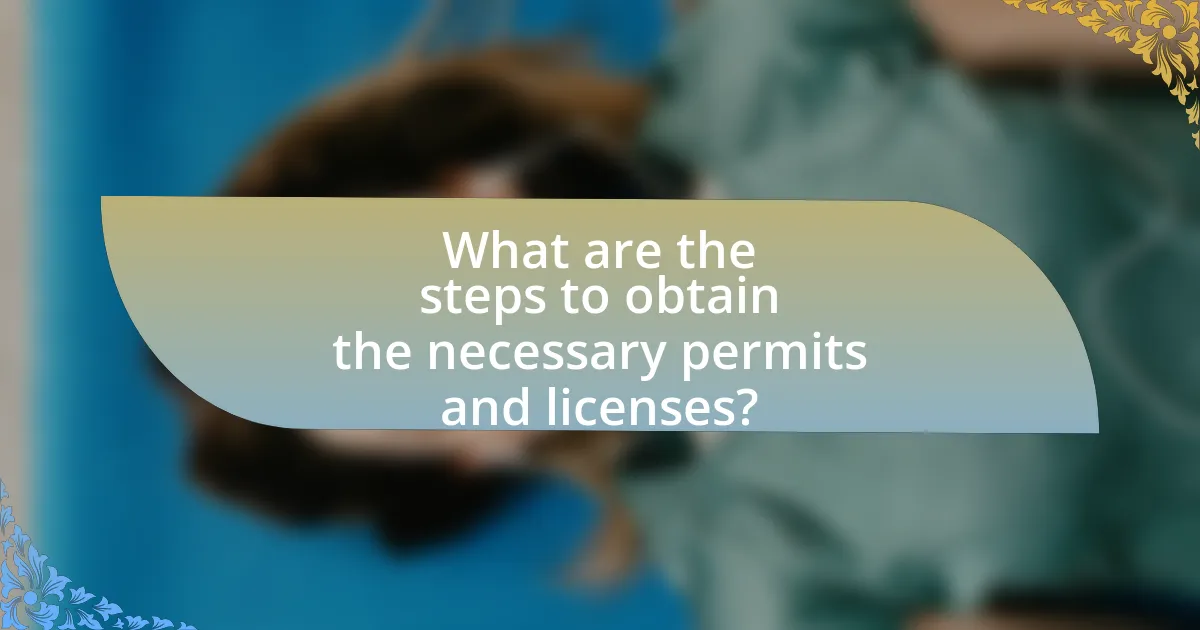
What are the steps to obtain the necessary permits and licenses?
To obtain the necessary permits and licenses for organizing a music festival, follow these steps: First, identify the specific permits required based on the festival’s location, size, and type of activities planned. This typically includes a special event permit, noise permit, health permits, and possibly alcohol licenses. Next, gather all required documentation, such as site plans, insurance certificates, and any necessary agreements with vendors or performers. After preparing the documentation, submit the applications to the relevant local government agencies, which may include city or county offices, health departments, and fire departments. Finally, pay any associated fees and attend any required hearings or meetings to finalize the approval process. These steps ensure compliance with local regulations and facilitate a successful event.
How can organizers prepare for the permit application process?
Organizers can prepare for the permit application process by thoroughly researching local regulations and requirements specific to their event type. This includes identifying the necessary permits, such as those for public gatherings, food service, and alcohol sales, which vary by location. Additionally, organizers should compile all required documentation, including site plans, insurance certificates, and safety plans, to streamline the application process. Engaging with local authorities early can provide insights into any potential challenges and help ensure compliance with all legal obligations.
What documentation is typically needed for permit applications?
Permit applications typically require documentation such as proof of ownership or lease of the venue, a detailed event plan, insurance certificates, and health and safety assessments. These documents ensure compliance with local regulations and demonstrate the organizer’s preparedness for the event. For instance, proof of ownership or lease verifies the right to use the space, while a detailed event plan outlines logistics, security measures, and crowd management strategies, which are crucial for public safety and regulatory approval.
How can organizers ensure compliance with local laws during the application process?
Organizers can ensure compliance with local laws during the application process by thoroughly researching and understanding the specific regulations that apply to their event. This includes consulting local government websites, engaging with legal experts, and reviewing relevant ordinances and codes that govern public gatherings, noise levels, and safety requirements. For instance, many municipalities have specific guidelines regarding permits for large gatherings, which can include health and safety regulations, zoning laws, and noise ordinances. By adhering to these regulations, organizers can avoid legal issues and ensure a smooth application process.
What is the timeline for obtaining permits and licenses?
The timeline for obtaining permits and licenses for music festivals typically ranges from several weeks to several months, depending on the location and specific requirements. For instance, local governments may require applications to be submitted at least 60 to 90 days prior to the event, while certain permits, such as those for health and safety, may take additional time for review and approval. Additionally, factors such as public hearings or community consultations can extend this timeline. Therefore, organizers should initiate the permit application process as early as possible to accommodate any potential delays.
How far in advance should organizers start the application process?
Organizers should start the application process for permits and licenses at least six months in advance of the music festival. This timeframe allows sufficient time to navigate the complexities of local regulations, secure necessary approvals, and address any potential issues that may arise during the application process. Many municipalities require extensive documentation and public notifications, which can take additional time to complete. Starting early ensures compliance with all legal requirements and helps avoid last-minute complications that could jeopardize the event.
What delays should organizers anticipate during the permitting process?
Organizers should anticipate delays during the permitting process due to factors such as bureaucratic inefficiencies, incomplete applications, and public opposition. Bureaucratic inefficiencies can arise from slow processing times within government agencies, which may take weeks or months to review applications. Incomplete applications often lead to requests for additional information, further extending the timeline. Public opposition can also cause delays, as community members may voice concerns during public hearings, prompting additional reviews or modifications to the proposed event. These factors collectively contribute to a lengthened permitting timeline, making it essential for organizers to plan accordingly.
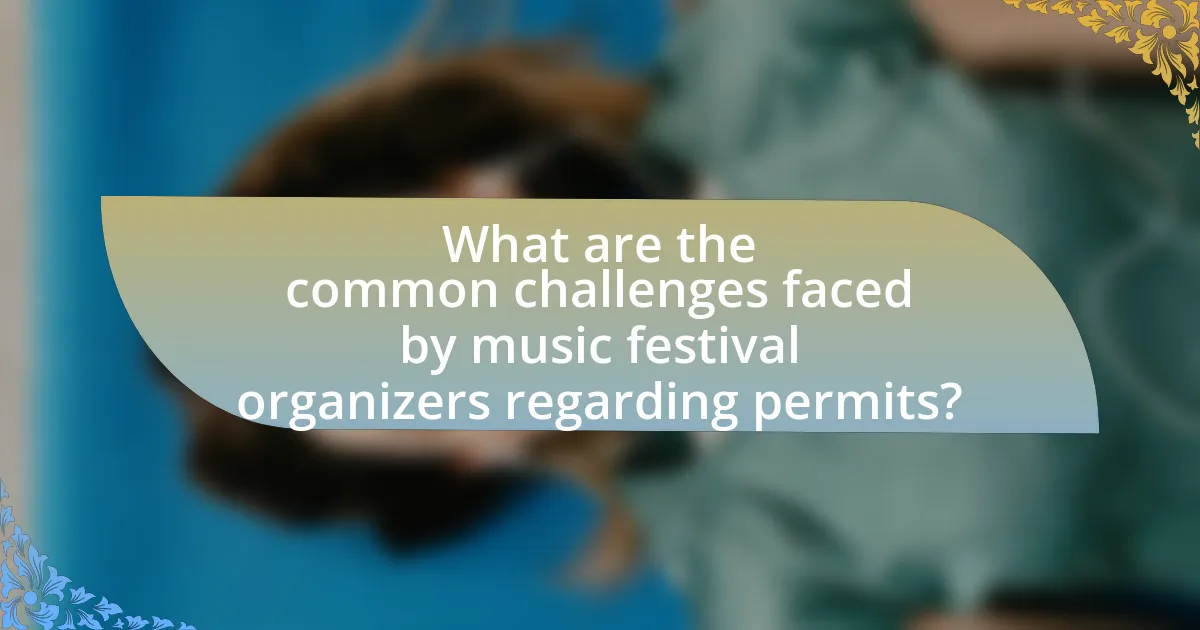
What are the common challenges faced by music festival organizers regarding permits?
Music festival organizers commonly face challenges such as navigating complex regulatory requirements, securing timely approvals, and managing community opposition regarding permits. Regulatory requirements often vary by location, leading to confusion and delays in the permitting process. For instance, festivals may need multiple permits, including those for noise, alcohol sales, and health and safety, which can complicate planning. Additionally, obtaining approvals from various governmental agencies can be time-consuming, with some permits requiring public hearings that may extend timelines. Community opposition can arise from concerns about noise, traffic, and safety, further complicating the permit acquisition process. These challenges highlight the need for thorough planning and engagement with local authorities and communities to facilitate smoother permit approvals.
What are the most frequent reasons for permit denials?
The most frequent reasons for permit denials include non-compliance with local regulations, insufficient safety measures, and inadequate insurance coverage. Local regulations often dictate specific requirements that must be met for a permit to be granted; failure to adhere to these can lead to automatic denials. Safety measures are critical, as authorities require detailed plans to ensure the well-being of attendees; lacking these plans can result in rejection. Additionally, many jurisdictions mandate proof of insurance to protect against liabilities; without adequate coverage, permits are frequently denied.
How can organizers address concerns raised by local authorities?
Organizers can address concerns raised by local authorities by engaging in proactive communication and collaboration. This involves scheduling meetings with local officials to discuss specific concerns, providing detailed plans that outline safety measures, crowd control, and noise management, and ensuring compliance with local regulations. For instance, organizers can present data from previous events demonstrating successful management of similar issues, thereby reinforcing their commitment to community safety and cooperation.
What strategies can be employed to avoid common pitfalls in the permitting process?
To avoid common pitfalls in the permitting process for music festivals, organizers should engage in thorough pre-planning and establish clear communication with local authorities. Pre-planning involves researching all necessary permits well in advance, understanding local regulations, and creating a detailed timeline for submissions. Clear communication with local authorities ensures that organizers receive timely feedback and can address any concerns proactively. Additionally, maintaining organized documentation and records of all communications and submissions can help streamline the process and prevent misunderstandings. These strategies are validated by the experiences of successful festival organizers who emphasize the importance of preparation and collaboration with regulatory bodies to navigate the permitting landscape effectively.
How can organizers effectively communicate with local authorities?
Organizers can effectively communicate with local authorities by establishing clear, consistent channels of communication and engaging in proactive dialogue. This involves scheduling regular meetings to discuss event plans, sharing detailed information about the festival, and addressing any concerns that authorities may have. For instance, providing a comprehensive event plan that includes safety measures, crowd management strategies, and emergency response protocols can foster trust and transparency. Additionally, utilizing official communication platforms, such as emails and formal letters, ensures that all correspondence is documented and professional. Studies show that effective communication can lead to smoother permit approvals and better collaboration, as seen in successful festivals that maintain strong relationships with local governments.
What best practices should be followed when engaging with officials?
When engaging with officials, organizers should prioritize clear communication and thorough preparation. Clear communication involves articulating objectives, timelines, and specific requests, ensuring that officials understand the needs of the music festival. Thorough preparation includes gathering all necessary documentation, such as permits and licenses, to demonstrate compliance with regulations. Additionally, building relationships through respectful interactions can foster cooperation and facilitate smoother processes. Research indicates that effective stakeholder engagement, including regular updates and feedback loops, enhances collaboration and trust, which are crucial for successful outcomes in public events.
How can building relationships with local authorities benefit festival planning?
Building relationships with local authorities can significantly enhance festival planning by facilitating access to essential permits and licenses. Strong connections with local officials often lead to streamlined approval processes, reducing bureaucratic delays that can hinder event organization. For instance, festivals that maintain good rapport with city planners and law enforcement are more likely to receive timely permits for venue use, noise regulations, and safety measures. Additionally, local authorities can provide valuable insights into community concerns and logistical considerations, ensuring that the festival aligns with local regulations and public safety standards. This collaborative approach not only fosters a positive relationship with the community but also enhances the overall success and sustainability of the festival.
What are the best practices for ensuring compliance with permits and licenses?
The best practices for ensuring compliance with permits and licenses include maintaining thorough documentation, conducting regular audits, and establishing clear communication with regulatory agencies. Thorough documentation ensures that all required permits and licenses are obtained and kept up to date, which is crucial for legal compliance. Regular audits help identify any discrepancies or lapses in compliance, allowing for timely corrective actions. Clear communication with regulatory agencies fosters a cooperative relationship, ensuring that organizers are informed about any changes in regulations or requirements. These practices are essential for music festival organizers to avoid legal penalties and ensure smooth event operations.
How can organizers keep track of permit requirements and deadlines?
Organizers can keep track of permit requirements and deadlines by utilizing project management software that includes calendar features and deadline reminders. This approach allows for the systematic organization of all necessary permits, ensuring that each requirement is logged with its respective due date. For instance, tools like Asana or Trello can help create a visual timeline of tasks, including permit applications and submission deadlines, which enhances accountability and reduces the risk of missing critical dates. Additionally, maintaining a checklist of required permits specific to the event location can provide a clear overview of what is needed and when, further supporting timely compliance with local regulations.
What resources are available to assist organizers in maintaining compliance?
Organizers can access various resources to maintain compliance, including government websites, industry associations, and legal consultants. Government websites provide guidelines and regulations specific to permits and licenses required for music festivals, ensuring organizers understand local laws. Industry associations, such as the National Association of Music Festivals, offer resources, best practices, and networking opportunities to help organizers stay informed about compliance issues. Legal consultants specializing in event management can provide tailored advice and support to navigate complex regulatory environments, ensuring that all necessary permits and licenses are obtained and maintained.
